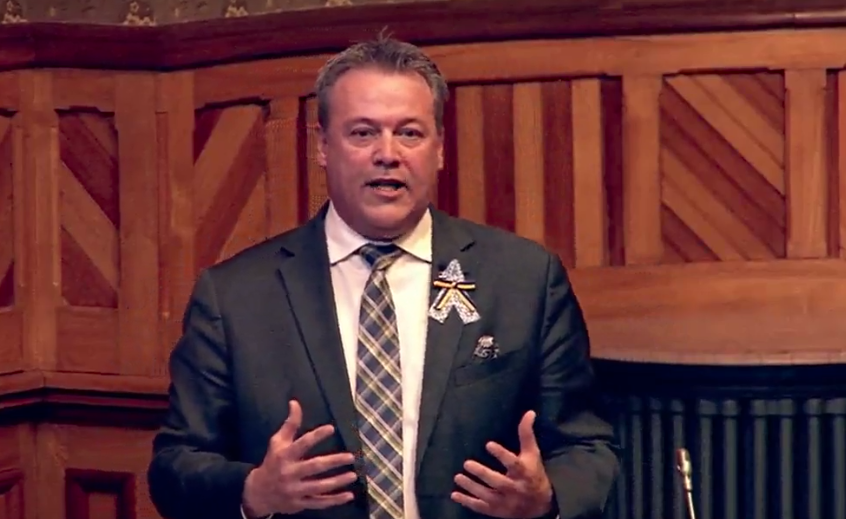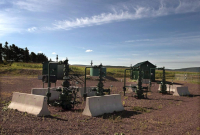The debate on fracking in New Brunswick continues as politicians in the legislative assembly face off over a proposal to ban oil and gas exploration and drilling.
Last week, Green Party Leader David Coon tabled a bill to end fossil fuel development. The bill was tabled with “urgency,” he said, after Premier Blaine Higgs said he would pursue fracked gas development with or without First Nations' consent. The bill goes to a vote on June 7.
“The premier is determined to expand the production of fossil fuels, specifically shale gas, by opening up fracking. This bill is a firm ‘no’ to that ambition,” said Coon.
“As citizens and as a province in one of the richest countries in the world, we have a responsibility to ensure that the premier takes his foot off that gas pedal right now.”
MLAs from all parties spoke to the bill Thursday after Coon’s introduction, where he stressed the global importance of transitioning off fossil fuels. He noted the International Energy Agency stated in 2021 that there can be no new oil, gas or coal development if the world is to reach net zero by 2050.
He pointed to Quebec, which in April 2022, became the first jurisdiction in the world to ban oil and gas development in its borders.
A moratorium on fracking in New Brunswick was imposed in 2013 after huge pushback and protests from Indigenous supporters – many from Elsipogtog First Nation – and other opponents. Coon noted that didn’t stop Higgs from discreetly carving out an exception in the Sussex area of the province in 2019. Those plans were later abandoned, but Coon warned that without clear legislation banning fracking more projects could come forward.
Minister of Energy and Resource Development Mike Holland, representing the Progressive Conservatives, spoke against the bill. He acknowledged climate change is a global problem, but insisted the province has been a “climate leader.” New Brunswick has reduced emissions to 39 per cent below 2005 levels, but saw a six per cent rise last year.
He noted the potential of natural gas as a transition fuel from oil and gas to renewable energy. However, fracked gas is still a planet warming fossil fuel, and evidence shows it should not be included in the energy transition.

“We have a strategy to increase renewables. We have a strategy to increase nuclear power. We have a strategy to increase the cleanliness and the emission-free nature of our grid to reach those goals,” said Holland. “But if you hamstring a government and don't allow them the options to explore lower emitting or non emitting means through either natural gas or nuclear, I ask you, what are the options that you're presenting?”
Meanwhile, Liberal member Keith Chiasson doesn’t support new fracking, but said the moratorium is in place to prevent expansion, and it’s working. He spoke against the Green Party bill for “trying to create a narrative” rather than push for a comprehensive energy plan. The bill is “weak,” he said.
The fracking moratorium includes rules: specifically, that it will not be lifted unless there is social licence and consultation with First Nations, Chiasson said. However, that social license isn’t present across the province, especially among First Nations. Last week, Mi'kmaq and Wolastoqey communities in the province criticized Higgs for dodging his responsibility to consult them. “The issue could get ugly here,” Chief Allan Polchies Jr. of Sitansisk, St. Mary’s First Nation, told Canada’s National Observer.
“I understand that [Coon] wants to put it into legislation because it makes it sound more serious and probably does. But regulations can be changed, and legislation can be changed. So if you think that by putting legislation, it will stop the Premiere from actually standing up and talking about fracking. You are wrong,” said Chiasson.
“He will continue to get up and spit out his old ideas of, you know, back in the day when fracking was accepted, ‘Oh those were the good old days.’ Just let him. Let him rant about that because we know it's not going to happen. We will not allow it. The people will not allow it.”
Green Party member Megan Mitton insisted the bill is straightforward, and said her party is addressing the energy transition with other bills and through the Standing Committee on Climate Change and Environmental Stewardship.
She said every fraction of a degree of warming matters and has a tangible impact on everything from livable working conditions to the increase of floods and droughts, while noting fracked – or shale – gas is made up mostly of methane.
“I think it’s shameful to not support this legislation, I think it would be shameful to support fracking. I think it is shameful to want to invest in new fossil fuel infrastructure,” she said.






Comments
Roughly how many gigawatts of wind would there be in the Bay of Fundy?
Everybody thinks of the Bay in terms of "we've got to be able to use that tidal power somehow", but another feature of the Bay is that it is very shallow, easy to put up wind turbines. It looks to be about 60km X 200km on the map, that's over 10,000 sq.km, surely about 5,000 wind turbines at 12MW each? 60GW, at an offshore capacity factor of 50%, is far more than required. (Far more than affordable, either - at $1/watt, that's still 60 billion....my point is that they have vast resources.)
This article speaks of developing less than 30GW of turbines, and a fair bit of pumped-hydro, and actually replacing the nuclear that NB is currently selling to Ontario:
https://policyoptions.irpp.org/magazines/february-2022/canada-offshore-…